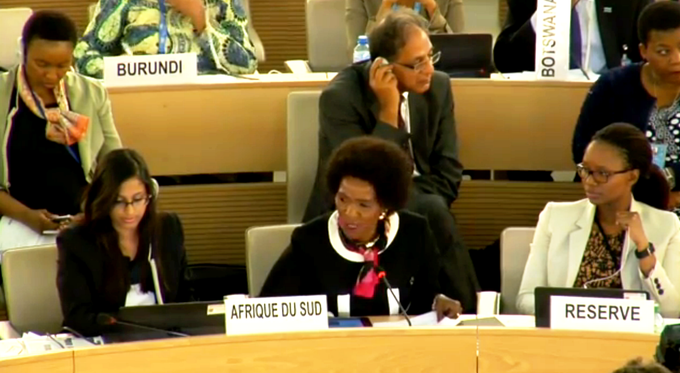South Africa abstains from UN vote to protect human rights
Resolution on gay rights watchdog passed without SA support
In a vote that surprised many, the South African delegation to the United Nations abstained on a key vote in the UN Human Rights Council to appoint an independent watchdog on sexual orientation. The resolution passed with 23 votes for, 18 against, and 6 abstentions.
The resolution establishes an independent expert on protection against violence and discrimination based on sexual orientation and gender identity for the next three years. The expert will report annually to the Human Rights Council and General Assembly on best practices to minimise sexual orientation and gender identity discrimination. It will work with states, UN agencies, and other organisations. Chile, Uruguay, Mexico, and Brazil were the core members to introduce and speak for the resolution.
Other abstentions included Botswana, Ghana and Namibia. Of the African countries included in the vote, Burundi, Cote d’Ivoire, Ethiopia, Kenya, Nigeria and Morocco voted against; no African country voted in favour of the resolution.
Previous progressive leadership
In 1996, South Africa became the first country to enshrine gay rights in its constitution. The Constitutional Court has consistently ruled that any form of discrimination based on sexual identity, whether by the government or a private entity, is unconstitutional.Consequently, South Africa is viewed as the most progressive African country on gay issues.
Internationally, South Africa has taken leadership in calling for global acceptance of gay rights. In 2011, its leadership was considered critical to pass a Human Rights Council resolution to recognise gay rights as human rights.
South Africa has often faced serious criticism from other African bloc countries for its vocal support of gay rights. In response to its 2011 resolution, the Nigerian delegation said that South Africa’s actions was “breaking in tradition of African group” and had almost no support within South Africa.
In 2014, South Africa again led similar initiatives to recognise and study sexual orientation and gender identity initiatives. The permanent representative to the United Nations at the time, Ambassador Minty, stated that South Africa was required by the “supreme law of our country to support a resolution that seeks to reduce discrimination and violence on any basis, including in this case, on the basis of sexual orientation or gendered identities.”
On 5 March 2016, the South African Human Rights Commission hosted the first regional African seminar to address violence and discrimination based on sexual orientation, gender identity and expression. Minister of Justice Michael Masutha attended the conference and called on all African communities to take even more action to end such violence and discrimination. The seminar resulted in the Ekurhuleni Declaration, of which the South African government was a party to. The declaration called for states to ensure that they were not perpetuating such “violence and discrimination directly or indirectly, through omission and commission.”
South Africa’s lack of support
The resolution passed on 30 June was seen by many as the next step in the process started by South Africa in 2011. Before the official vote, South Africa’s delegate Ambassador Nozipho Mxakato-Diseko stated that while South Africa believed no person should be discriminated against on any ground, the resolution itself was too divisive, unnecessary, and an ‘arrogant approach.’
Speaking to the council, Ambassador Mxakato-Diseko also said, “We learned from our struggle against apartheid that if we are clear about the end goal, which for us is the end of violence and discrimination against the LGBTI (lesbian, gay, bi-sexual, trans-sexual and intersexed) persons, a better approach is building maximum consensus. This could have been achieved but for the arrogant and confrontational approach adopted [by the sponsors]…Grandstanding, recklessness, brinksmanship and point scoring will take us nowhere.”
It is unclear what exactly makes this resolution any more divisive than the previous resolutions South Africa had pursued.
Over the past few months, activists have grown increasingly concerned that the South African government has backed down from speaking out for LGBTI rights on the international stage. They fear that continued abstentions and silence will strengthen the position of other African bloc countries, such as Uganda and Nigeria, that blatantly discriminate against the gay community.
In its abstention, South Africa is joined by Botswana, Ghana, India, Maldives, and the Philippines. Many countries that abstained or voted against the resolution cited concerns of national sovereignty and cultural differences. No African bloc country voted in favour of the resolution.
Matthew Clayton, the research, advocacy and policy manager for the Triangle Project, an gay human rights organisation in South Africa, said he was unsure why the government had decided to abstain on the resolution, especially given its leadership and previous support of similar resolutions, and very recent domestic legislation to improve gay rights. He felt that the abstention went against the constitutional provisions and state agreements such as the Ekurhuleni declaration.
However, he did not see the abstention as part of a trend. He said that the South African government was still working closely with many local organisations and stakeholders, especially to develop stronger hate crimes legislation.
He said South Africa had to tread a very careful line to effectively use its diplomatic clout, but he believed that “abstaining from a vote is a very regrettable lapse for a country that should be championing all forms of human rights at all times”.
“It sends a very confusing message, and our actions in these international settings still do have regional implications and effects.”
Support independent journalism
Donate using Payfast

Don't miss out on the latest news
We respect your privacy, and promise we won't spam you.
Next: The difficult exit from the gang
Previous: Plastic View devastated by fire
© 2016 GroundUp. 
This article is licensed under a Creative Commons Attribution-NoDerivatives 4.0 International License.
You may republish this article, so long as you credit the authors and GroundUp, and do not change the text. Please include a link back to the original article.

